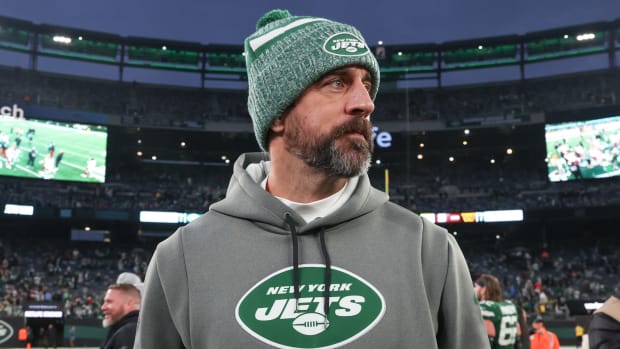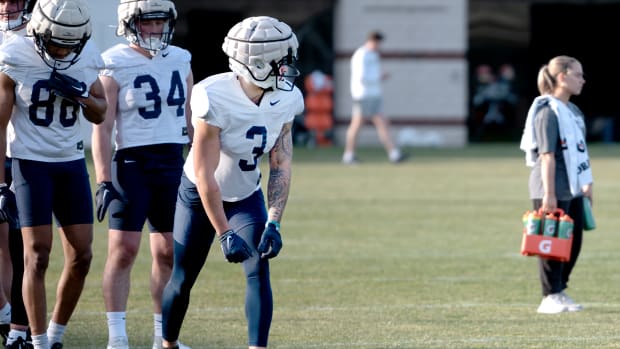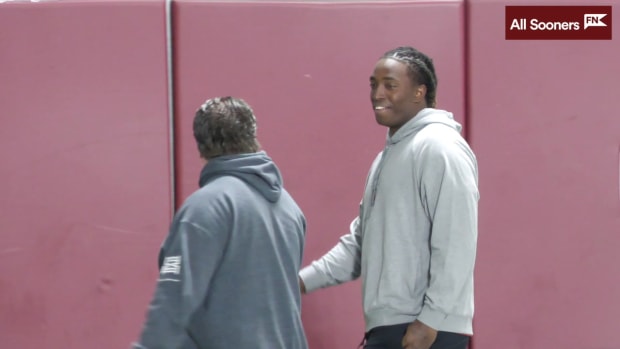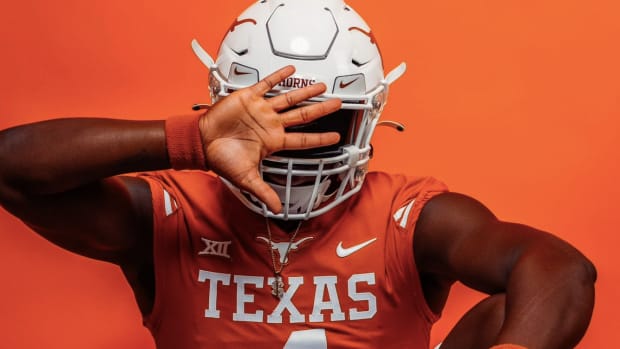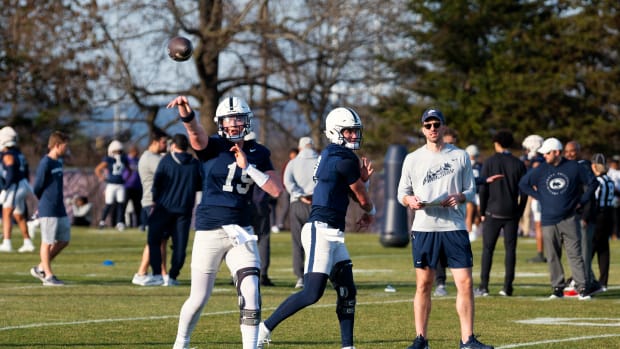Gauging the Futures Market for Joe Brady, College Football's Hottest Assistant
NEW ORLEANS — As the offensive numbers have exploded at LSU and the victories have piled up and Joe Burrow has transformed from average starting quarterback to Heisman Trophy winner and potential No. 1 draft pick, one question has floated in the Tigers’ supersonic vapor trail:
How hot, exactly, is the Joe Brady Futures Market?
The sport is trying to calibrate the career arc of the 30-year-old man widely credited with transforming this chronically stultifying LSU offense into a thing of wonder. Only one major change has occurred year-over-year, as the Tigers have vaulted from 69th nationally in total offense to first; from 65th in pass efficiency to second; from 67th in passing offense to second; and from 38th in scoring offense to first. That change was the addition of Brady as the passing game coordinator, brought in after two seasons as a low-profile offensive assistant under Sean Payton with the NFL's New Orleans Saints.
And so Gridworld is understandably intrigued by a shiny new toy it knew very little about prior to this season. Intrigued but guarded, it should be noted, because this is verging on uncharted territory.
The overarching Futures Market question comes with a subset of additional questions. Specifically:
Where does Joe Burrow end and Joe Brady begin?
How young is too young?
How inexperienced is too inexperienced?
And, on the flip side: how good is too good to pass up?
“He’s the hot new five-star recruit,” said one agent who works primarily in the college football space.
At least one Power 5 school, Mississippi State, kicked the tires on the crazy idea of hiring a guy who is just completing his first season of full-time FBS coaching experience. Sports Illustrated reported this week that State athletic director John Cohen was considering Brady for its vacancy, which was filled Friday by a much more experienced (but iconoclastic) coach, Washington State’s Mike Leach.
By the end of 2020, many more schools could jump into the Brady Futures Market. Or they may be backing off. Sports Illustrated anonymously polled a half-dozen people who work in the industry for their candid thoughts on Brady, and most were guarded given the small body of work—no matter how impressive it is.
“A lot of my work is mitigating risk,” said the head of a search firm that specializes in college coaching searches. “And in my mind a guy like Joe Brady has a lot of risk right now. I would be leery of a flash-in-the-pan coordinator. Now, maybe he goes on to be a great Power 5 head coach, but I would want to see a little more first.”
That outlook was echoed by several athletic directors. While there always is an urgency in football to identify the brightest new minds, rushing into a big-dollar, long-term contract with someone who isn’t ready is a potential job killer for administrators.
“So little experience, it’s challenging,” one AD said. “He’s obviously a smart person and has some excellent skills to build upon. I’d want more info on his recruiting ability, what’s his vision and how convincing is he on his ability to implement if you think it’s a good plan. What would his staff look like?”
A common theme among athletic directors was finding out what else Brady brings to the table beyond drawing up plays. There is far more to the job of being a head coach than that.
“The challenge with any coordinator is that in modern coaching—all sports and all levels—culture beats scheme every time,” said another AD. “I am not so sure that Dabo (Swinney), Ed O(rgeron) or P.J. (Fleck) knows the gameplan on most Saturdays, but they are really good at building a sustainable culture, assembling and managing a staff, and recruiting.”
Added a third AD: “The bigger question is, can he run the show? Can he manage staffing? What’s his approach to player discipline? It’s not just coaching football and calling plays. You’d have to get in front of the guy and find out if he has the maturity.”
Several administrators emphasized that element: given the scant résumé to date, Brady would have to interview well. At this early juncture, he doesn’t have the clout to basically arrange a job through third parties without meeting—and impressing—the people doing the hiring.
“If you feel he’s a viable candidate, his interview and communication skills would be critical,” one athletic director said. “Even more than a more experienced candidate, where you have more of a track record to see.”
Here’s what would enhance Brady’s track record more than anything else in 2020: helping coordinate another explosive offense that isn’t led by a transformational quarterback. That would go a long way toward answering the question of whether the LSU renaissance is a Burrow thing or a Brady thing.
“My concern would not be age so much as doing it without Joe Burrow,” said an AD whose team faced LSU this year. “Maybe he’s responsible for Joe Burrow. Was Joe Burrow a special case? Or is he a master scheme guy who can make any quarterback better?
“Our coaches don’t think their play structure is that special. They think they have great players running the plays.”
Still, the stats on Burrow are radically different from pre-Brady to with Brady. His efficiency rating has risen an unfathomable 71 points from 2018 to ’19, thanks to the following year-over-year improvements: accuracy up 20%, to what would be an NCAA-record 77.6% if he maintains it; yards per attempt up from 7.6 to 10.9; touchdown passes up from 16 to 55; and yards per game up from 222 to 372.
With head coaches trending both younger and more toward offensive innovation, the concerns about Brady’s age likely would lessen appreciably with another outstanding season under his belt. From Sean McVay to Matt LaFleur and beyond, the NFL has had its infatuation with thirtysomething hires. Oklahoma elevated Lincoln Riley to head coach at age 34, and Ohio State did the same with Ryan Day at age 39.
But inheriting flush teams at blueblood programs is one thing. Most other jobs are not like that.
“You’d have to inherit a place like Ryan Day or Lincoln Riley did,” one former AD said. “Then you might not miss a beat. He might be the next Lincoln Riley, but at 30 years old that’s a lot to ask.
“I like to win the press conference, but I’m more concerned about where I’m going to be in five years. There’s certain places you don’t have five years. If Joe Brady wants to be the head coach at Oklahoma, Florida, Penn State, you don’t have time to have a losing season.
“It can eat your ass up if you haven’t been a head coach before. You only get to be a head coach the first time one time. Make sure the first one doesn’t hurt you.”
The search-firm head surmised that Brady is close to elevating himself above a first head-coaching job at a Group of Five school—he wouldn’t have to start on the lower end of the food chain. At this age and stage, Brady probably would be a more attractive option to a Mississippi State-level Power 5 school. While the power programs wait for a coach to develop into a full-blown star, the strivers often need to take a risk on someone who would otherwise be out of their reach in another year or two.
One AD pointed to a couple of recent hires in that category—one a home run, one a strikeout. That was Minnesota landing P.J. Fleck, and Arkansas getting Chad Morris. Fleck is a hero in Minneapolis, and Morris is out in Fayetteville after less than two seasons.
That, stressed another athletic director, is where due diligence matters beyond both a coach’s age and his statistics. Who can become the complete package demanded of a modern college football head coach?
“Youth and inexperience just impact the risk profile, they are not disqualifiers,” he said. “So it really doesn’t matter if Joe is an offensive wizard so much as whether you can find in his background enough evidence to convince you that he can do the other stuff. The Giants think they see it in (38-year-old former Patriots assistant) Joe Judge—a guy who coached wideouts on a team with terrible wideouts. So if somebody sees it in Joe Brady they should grab him.”

